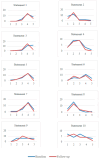Feasibility, Acceptability, and Impact of Recovery-Oriented Practices in an Italian Community Mental Health Service: A Pilot Study
- PMID: 40217730
- PMCID: PMC11990030
- DOI: 10.3390/jcm14072280
Feasibility, Acceptability, and Impact of Recovery-Oriented Practices in an Italian Community Mental Health Service: A Pilot Study
Abstract
Background: Over the past decade, Italy has made progress in adopting recovery-oriented approaches in mental health care, though full alignment with international guidelines remains incomplete. This study investigates the feasibility, acceptability, and impact of integrating recovery-oriented practices in an Italian Community Mental Health Service (CMHS), focusing on both user and professional perspectives to identify strengths and areas for improvement. Methods: A longitudinal pilot study was conducted at the South Verona CMHS. Data on users' socio-demographic and clinical characteristics, symptoms, functioning, needs, and autonomy were collected at baseline and six-month follow-up. Participants included individuals in supported accommodation and outpatient care. The Mental Health Recovery Star (MHRS) assessed recovery progress. Qualitative data from focus groups and interviews captured users' and professionals' experiences. Results: Nineteen professionals completed the MHRS with 25 users, who demonstrated significant improvements in MHRS scores (p = 0.003), romantic relationships (p < 0.001), employment (p < 0.001), functioning (p = 0.015), psychopathology (p = 0.001), functional autonomy (p = 0.003), and unmet needs (p = 0.026). Qualitative findings emphasized the value of a personalized, holistic approach but noted gaps in follow-up and shared decision-making. Focus groups (30 participants) highlighted recovery as a process of hope, meaning, and empowerment. Participants called for ongoing education, structural changes, and peer-support initiatives. Professionals reported increased motivation. Conclusions: Integrating recovery-oriented practices within the South Verona CMHS was both feasible and acceptable. The MHRS positively impacted service users' personal recovery and professionals' motivation. The study underscores the need for continued training, structural reforms, and peer-support initiatives to foster lasting changes and enhance CMHS practices.
Keywords: community mental health service; focus group; mental health recovery star; pilot study; recovery.
Conflict of interest statement
The authors declare no conflicts of interest.
Figures


References
-
- WHO . Mental Health Declaration for Europe “Facing the Challenges, Building Solution”. WHO; Geneva, Switzerland: 2005. European Ministerial Conference on Mental Health; pp. 81–84. - PubMed
-
- European Commission . Green Paper: Improving the Mental Health of the Population: Towards a Strategy on Mental Health for the European Union. European Commission; Brussels, Belgium: 2005.
-
- United Nations . UN Convention on the Rights of Persons with Disabilities. United Nations; New York, NY, USA: 2006.
-
- Caldas de Almeida J., Killaspy H. Long-Term Mental Health Care for People with Severe Mental Disorders. Report for the European Commission; Luxembourg: 2011.
-
- NICE . Rehabilitation for Adults with Complex Psychosis. National Institute for Health and Care Excellence; London, UK: 2020.
LinkOut - more resources
Full Text Sources
Miscellaneous

